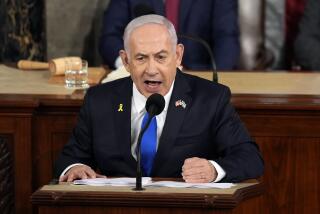Congressmen Voice Support, Some Doubts
- Share via
WASHINGTON — Congressional leaders, who were told of the attack on Libya about three hours before the bombs were dropped, expressed support Monday night for the retaliatory strike, even though some Democrats charged that President Reagan had effectively declared war against Libya without seeking the approval of Congress.
Democrats as well as Republicans predicted that the attack would have widespread support in the Congress and among the American people.
“I just believe the President did what the American people would have wanted him to do--a proportionate response to an act that had (Libyan leader Moammar) Kadafi’s fingerprints all over it,” Senate Majority Leader Bob Dole (R-Kan.) said.
Full Support Predicted
Sen. Sam Nunn of Georgia, ranking Democrat on the Senate Armed Services Committee, predicted that once members of Congress view the evidence linking Kadafi to a terrorist bombing in a West Berlin nightclub earlier this month, in which an American soldier was killed, they will fully support the President’s action.
“I would have preferred an economic embargo, but our allies have not made that possible,” Nunn said.
Congressional leaders learned about the impending air strike during a hastily called meeting with the President at 4 p.m.--after the operation was already under way but about three hours before the bombs fell on Libya. Participants said Reagan’s national security adviser, John M. Poindexter, told them that it was not too late to halt the attack if they objected.
“There wasn’t any opposition,” Dole recalled, “although there was a feeling that they should have been consulted earlier.”
Even before the meeting, Sen. Richard G. Lugar (R-Ind.), chairman of the Senate Foreign Relations Committee, had complained publicly that he was not being kept informed by the White House, as required under the War Powers Resolution.
Lugar’s counterpart in the House, Rep. Dante B. Fascell (D-Fla.), chairman of the House Foreign Affairs Committee, suggested that the President also acted without regard to the Constitution, which invests in Congress the right to declare war. He called it “a broad arrogation of power by the President.”
‘New Kind of Warfare’
“This is not peace,” Fascell said. “We’ve got a new kind of warfare here. Has the Constitution been complied with? The question is whether there is any responsibility for Congress here. We are talking about a precedent that will stay with the country for a long time.”
Congress has not declared war since 1941, when the Japanese bombed Pearl Harbor. The War Powers Resolution, which was approved in the post-Vietnam era, allows the President to put U.S. troops into hostile action for 60 days, after which he must seek the approval of Congress.
Although Reagan has previously challenged the legality of the limitations placed upon the President’s prerogatives under the resolution, his aides told congressional leaders Monday night that he intended to comply with it in this instance. But Fascell countered that it was the Constitution--not the War Powers Resolution--that applied in this case.
Involvement of Congress
“Otherwise,” he said, “it means that the only time that Congress would be involved is when someone dropped a bomb on the United States.”
Likewise, Senate Minority Leader Robert C. Byrd (D-W.Va.) questioned whether the President was setting a precedent for the future. “Are we going to do this again and again and again?” he asked. “I’m concerned there won’t be any end to that approach. . . . Suppose Syria or Iran conducts terrorism. What then?”
Byrd charged that the Administration also failed to comply with the War Powers Resolution, which he said requires more extensive consultation with Congress. “We were not consulted; we were notified of a decision that had already been made,” he said.
Yet even Fascell and Byrd indicated support for the raid. “I think the United States must respond to acts of terrorism,” Fascell said. “We’ve tried everything else, so this is the next step.”
Johnson, Carter Precedents
Lugar defended the President’s right to act as he did, noting that President Lyndon B. Johnson did not notify Congress before escalating U.S. involvement in Vietnam and that President Jimmy Carter did not warn the lawmakers before he attempted an unsuccessful rescue mission of Americans held hostage in Iran. “This is no new precedent,” he said.
He added that the President’s actions were completely within international law, which allows acts in self-defense as long as they are proportionate. He said the air strike “sends the strong message to Libya that the United States will not tolerate the indiscriminate violence or terrorism against us.”
Rep. Tony Coelho (D-Merced) said he expects the American people to support Reagan’s action, even though polls show that the public was opposed to such a strike by a margin of 2 to 1. He also questioned whether the strike would beget more terrorism.
“Kadafi is a madman,” he said. “This will escalate instead of de-escalate.”
But Sen. Pete Wilson (R-Calif.) disagreed.
‘We’ll Do It Again’
“I think it is a deterrent,” he said. “If we have to do it again, we’ll do it again.”
California Rep. Robert K. Dornan (R-Garden Grove), a member of the House Near East subcommittee, described the attack to avenge terrorist acts as “biblical in its applications.”
“I hope we devastated the lair of some of the killers,” he said. “I’m so proud that I’m an American, not like the European countries that put economic interests above everything else.”
In Detroit, Robin Beecham, brother of Sgt. Kenneth T. Ford, who was killed in the bombing in West Berlin, indicated that he believes that the President’s action was long overdue. “I think he probably should have done something long ago,” Beecham said.
Times staff writer Bob Secter contributed to this story.
More to Read
Get the L.A. Times Politics newsletter
Deeply reported insights into legislation, politics and policy from Sacramento, Washington and beyond. In your inbox twice per week.
You may occasionally receive promotional content from the Los Angeles Times.










